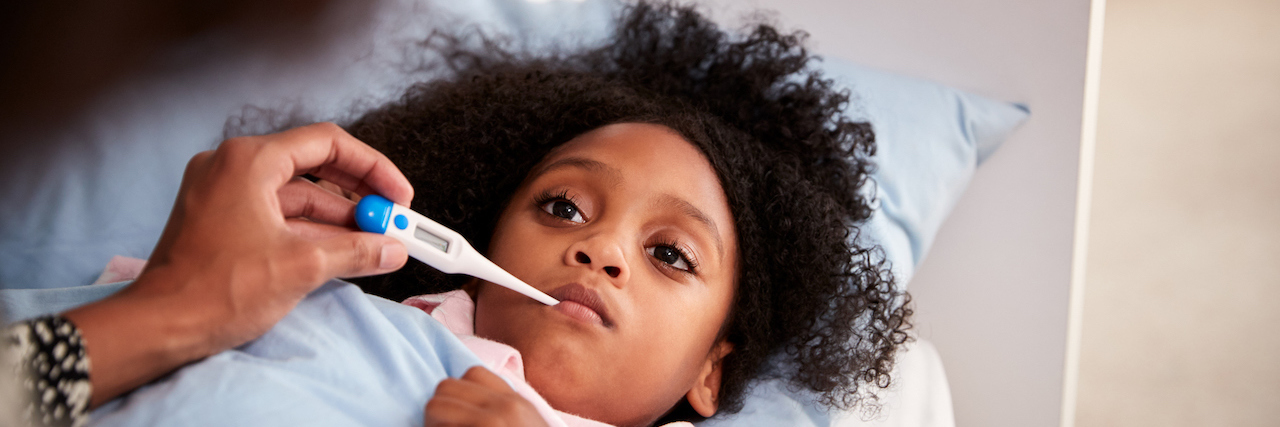How COVID-19 Symptoms May Present in Kids
Editor's Note
Join The Mighty’s Coronavirus group to connect with other Mighties living through the pandemic. Read the latest updates, share helpful tips, or give and receive virtual support.
When the COVID-19 pandemic hit, the focus was largely on its deadly nature for people over the age of 65. And rightly so — the most serious cases and deaths occur among this population. However, as experts learn more about the virus, it’s become clear that COVID-19 can affect people of all ages in a variety of ways — some deadly.
Most recently, a 5-year-old boy in New York died from pediatric multisystem inflammatory syndrome, a rare disease occurring in children that doctors believe is linked to COVID-19. Experts believe that young people are more likely to be asymptomatic and show few or no COVID-19 symptoms while still spreading the virus. We’re learning new information about the coronavirus daily. While it may be scary to read about new symptoms, it’s important to be aware of the different ways the disease can present itself.
Pediatric Multisystem Inflammatory Syndrome
Doctors in New York reported that more than 60 kids and teens have been hospitalized with an inflammatory syndrome that’s causing symptoms similar to Kawasaki disease and believed to be linked to COVID-19. Doctors in other countries around the world have reported the same issue in children and teens. The new syndrome is being referred to as pediatric multisystem inflammatory syndrome.
Kawasaki disease is a condition that causes inflammation in blood vessels throughout the body. It typically affects children under the age of 5. The disease causes symptoms such as:
- Persistent fever (five days or longer)
- Rash
- Pink eye
- Swollen hands and feet
- Swollen lymph nodes
- Cracked and dry lips
- “Strawberry tongue,” a tongue that appears swollen and bumpy
Based on available evidence, COVID-19-related pediatric multisystem inflammatory syndrome leads to similar symptoms, but with more heart inflammation than doctors would expect with Kawasaki disease. Lab tests also look completely different and the COVID-19 condition can impact older children and teens more frequently.
According to experts who spoke with NPR, kids who have the inflammatory condition typically tested positive for COVID-19 or its antibodies, though the condition can appear days or weeks after COVID-19 itself. Previous evidence suggests COVID-19 can trigger an overactive immune system response that causes serious illness.
“One theory is that as one begins to make antibodies to SARS-COV-2, the antibody itself may be provoking an immune response,” Jane Newburger, M.D., MPH, director of the Kawasaki Program at Boston Children’s Hospital, told NPR. “This is only happening in susceptible individuals whose immune systems are built in a particular way. It doesn’t happen in everybody.”
Toxic Shock Syndrome
Doctors have also reported cases of young people coming into the hospital with symptoms that resemble toxic shock syndrome. The symptoms are similar to Kawasaki disease in its second phase and the new pediatric multisystem inflammatory syndrome, including digestive symptoms. The symptoms of toxic shock syndrome include:
- Fever
- Rash
- Diarrhea
- Vomiting
- Abdominal pain
Though doctors are reporting more cases of children with this serious inflammatory condition, it’s still very rare. In addition, most (though not all) children who develop pediatric multisystem inflammatory syndrome or symptoms of toxic shock are able to recover with intensive supportive care. If your child has a persistent fever, that can be an early sign of the condition and warrants a call to the doctor.
Symptoms of COVID-19
Regardless of your age, you should still be on the lookout for the more “classic” signs of COVID-19 experts have identified. These symptoms can include:
- Fever
- Cough
- Shortness of breath
- Sudden loss of taste or smell
- Chills
- Muscle pain
- Sore throat
- Digestive issues
If you or your child has any of the above symptoms or concerns about your health, call your doctor. Your doctor can determine if you should get tested for COVID-19 and how you should proceed. According to the Centers for Disease Control or Prevention (CDC), if you or a loved one has significant trouble breathing, persistent pain or pressure in your chest, disorientation or lethargy, or bluish lips, call for emergency help.
The Takeaway
Efforts are already underway to understand how and why COVID-19 affects people differently, including children. Some studies are looking at genetics while others look at risk factors based on underlying conditions or immune system response. Regardless, experts want to understand how COVID-19 can have such a major — and sometimes sudden — impact on young people.
“There are going to be individuals that are younger, for whatever reason, maybe idiosyncrasies in their immune system or their genetics, that are going to be prone to severe infection,” Amesh Adalja, M.D., a senior scholar at the Johns Hopkins Center for Health Security, said according to Elemental. “It’s really important that we figure out what the risk factors for death are in those younger age cohorts so that we can demystify it, so it’s not a lightning bolt from heaven that struck somebody down.”
Header image via monkeybusinessimages/Getty Images

